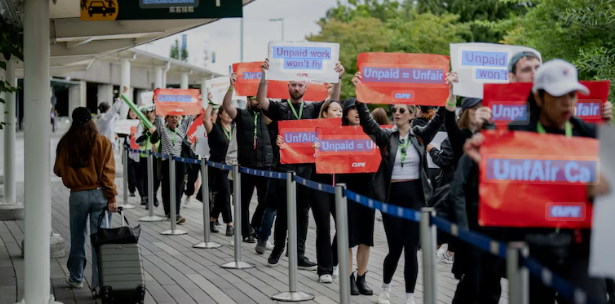The aviation industry has always been a sensitive barometer of global economic conditions, labor relations, and consumer sentiment. Today, the Air Canada strike shakes air travel. Because the strike has affected passengers, plans, and markets, it has become a matter of global concern for tourists, investors, and companies.
This article talks about the Air Canada strike: what caused it, how it affected the travelers and the economy, and how these adverse effects might be averted if similar situations reappear in the future.
What Triggered the Air Canada Strike?
The Air Canada strike boils down to the conflict between management and employees over working conditions, wages, and job security. Like many airlines, Air Canada is recovering from the pandemic’s financial shocks amid record-high travel demand in 2023–24. Unfavorable pay and wages and loading benefits will be paid to workers keeping their workloads increasing.
Union representatives have brought out three major problems:
- Fair Compensation: Despite huge profits Air Canada has declared, workers claim their salaries have not been adjusted for inflation or industry standards.
- Work-Life Balance: Long hours, being short-staffed, and scheduling issues have left employees feeling overworked and underappreciated.
- Job Security – Automation, outsourcing, and restructuring are sowing fears among worker classes about what the pipe job must have meant for long-term stability.
With talks at an impasse, workers went on strike, grounding flights and crippling Canada’s travel industry.
How the Air Canada Strike Affects Travelers
The Air Canada strike has indeed been a storm of changes for passengers. So many flights have been canceled or delayed that travelers are scrambling for alternatives. The impact extends beyond Canada, as Air Canada’s global routes across North America, Europe, and Asia create a worldwide ripple effect.
Immediate impacts on travelers include:
- Cancellations and delays – The strike interrupts trips for business, holidays, or family reunions.
- The price hike in ticket fares – The demand arises for other competitors like WestJet, Delta, or United Airlines, and fares for alternative routes have skyrocketed.
- Reduced connectivity- Smaller cities, that mostly relied on Air Canada connections, have fewer travel options now.
- Compensation challenges- While some passengers may be entitled to a refund or voucher, the process has been painstakingly slow and frustrating for many.
The Air Canada strike reminds travelers to book with contingency plans, insurance, or flexible itineraries.

The Economic Ripple Effect
Air Canada strikes are travel inconveniences and economic disasters. The cancellation or diversion by international tourists puts the Canadian tourism sector, whose survival depends significantly on a strong summer travel season, into huge losses. Likewise, businesspeople are unable to attend conferences and meetings, thereby seemingly slowing cross-border commerce.
Key areas of economic impact:
- Tourism losses: Hotel, restaurant, and local attraction revenues are taking a hit because of cancellations.
- Airline competition: Rival carriers win temporary gains, yet the very industry at large is faced with instability.
- Cargo delays-Air Canada is an important player in cargo transport; disruption will cause wrangling in trade supply chains.
- Stock-market reactions: Air Canada’s stock experienced some turbulence as investors scrutinized labor negotiations.
Strikes add pressure, while inflation, interest rates, and global trade create further headwinds.
Investor Insights: Air Canada Strike and the Market
The Air Canada strike is more than just a headline for followers of financial markets; it is a case study on how labor unrest can impact corporate performance. When labor talks were in progress, shares in Air Canada fluctuated. Investors differed on whether the strike posed a short-term disruption or a long-term bottleneck for the airlines.
What investors should consider:
- Short-term volatility — Strikes seem to bring in trough-like oscillations that are good entry points for investors who want to take their chances.
- Union strength — Negotiations will decide the future cost structure for the airline. Higher wages would then weigh on margins but lift employee spirit, which could translate to better service.
- Industry-wide effects — Other airlines may have the same problems with their labor issues, meaning the Air Canada strike might just be one trend among many.
- Government role — If the strike heavily disrupts travel and trade, Canada’s government may intervene, reshaping the financial landscape.
Cautious investors may prefer diversifying across airlines or travel ETFs instead of betting solely on Air Canada stock during this uncertainty.
Lessons for Passengers and Businesses
The Air Canada strike wakes everyone in the airline industry-working in travel, business, or investment.
- For passengers: Always carry travel insurance, book flexibly, and stay updated on airline refund and compensation policies.
- businesses: Businesses reliant on air travel should plan contingencies with virtual meetings, alternate carriers, or flexible bookings.
- investors: Labor relations, fuel prices, and evolving demand patterns must all be considered when analyzing the air transport sector. The strike of Air Canada is just another event of a larger labor movement that is carving out industries worldwide.
The Bigger Picture: Labor Rights in the Aviation Industry
The Air Canada strike brings forth labor rights issues, corporate responsibility issues, and the question of profit versus employee welfare. Grievances ignored in a volatile market are far costlier to resolve when strikes bring operations to a screeching halt.
In a way, the strike may indeed set a precedent for shaping future airline negotiations worldwide. With collective action so effectively demonstrated, now pilots, flight attendants, ground crew, and other aviation workers all over the world may feel empowered to press for better contracts. click here
Preparing for the Future
The strikes are in a way the yoga exercise to labor relations; more can be expected in aviation as demand, economic uncertainty, and cost of living fuel tensions with management.
Each and everyone-the travelers, business owners, and investors-should prepare for reacting to these realities. From diversifying their investments and travel options to joining the movement for just labor practices, all have a hand in crafting a more stable and equitable future for the aviation industry.
The Air Canada strike is more than just a labor dispute; This is the moment where we reflect on the balance between profits, employees, and customers. While the strike does bring some agony to the travelers, it may well lead to a fairer and stronger airline industry.
The lesson for travelers is flexibility. For the investors, it is to identify risks and opportunities within the airline sector. And workers should remember: form alliances that bring forth meaningful change.
While the strike is currently underway, one thing is for sure: The Air Canada strike will forever remain etched in Canadian aviation history as such an event that shaped policies, investment-worthy projects, and passenger expectations for years to come.











